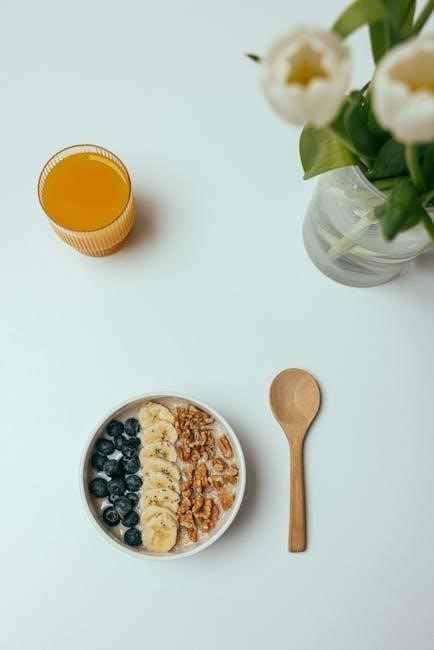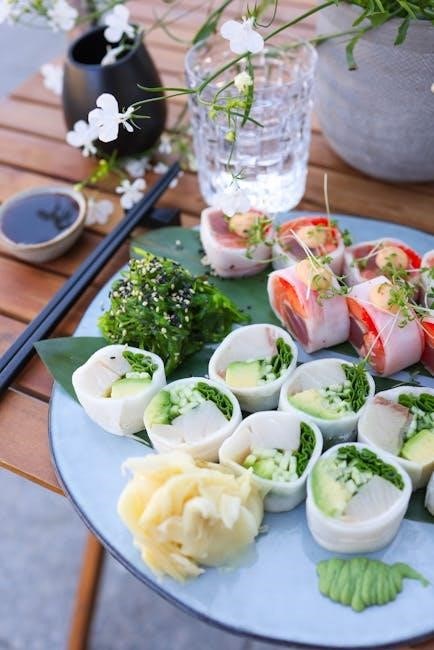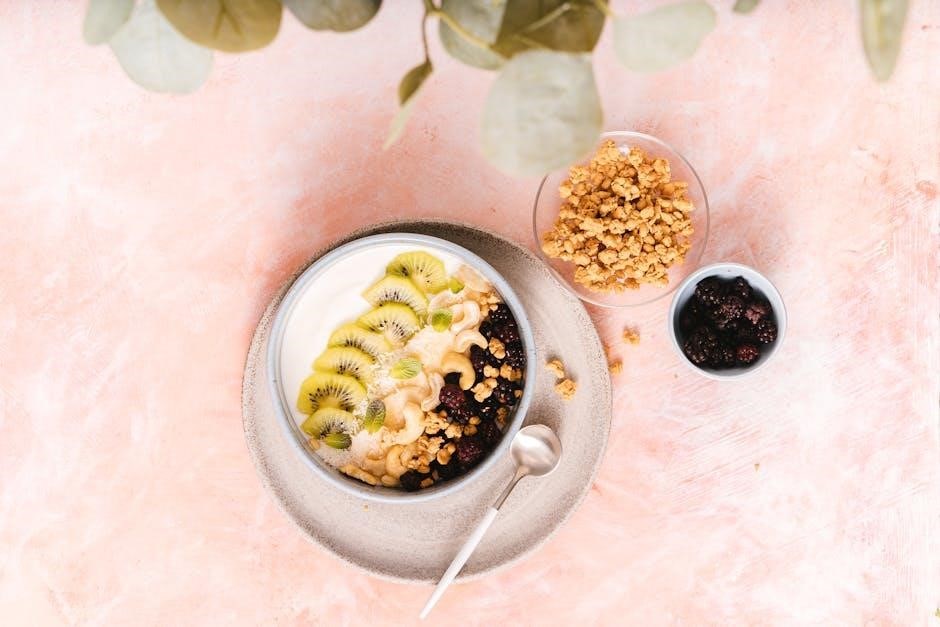
21 day plant-based meal plan pdf
Embark on a transformative 21-day journey with a structured, plant-based meal plan designed to nourish your body. Discover delicious, wholesome recipes and expert tips to kickstart your healthy lifestyle effortlessly.
This comprehensive guide offers meal ideas, grocery lists, and motivational advice to help you embrace plant-based eating. Perfect for beginners, it simplifies the transition to a balanced, anti-inflammatory diet.
With a focus on variety and nutrition, this plan helps reduce inflammation, boost energy, and support overall well-being. It’s more than meals—it’s a pathway to long-term health and vitality.
Benefits of a Plant-Based Diet
A plant-based diet offers numerous health benefits, including reducing the risk of chronic diseases like heart disease, diabetes, and certain cancers. It promotes weight management, improves digestion, and boosts energy levels.
By focusing on whole, unprocessed foods, this diet helps lower cholesterol and blood pressure, enhancing overall cardiovascular health. It also supports anti-inflammatory responses, which can alleviate conditions like arthritis and improve skin health.
Plant-based eating is environmentally friendly, reducing greenhouse gas emissions and water usage associated with animal agriculture. It encourages a sustainable lifestyle while providing essential nutrients like vitamins, minerals, and fiber.
Adopting this diet can also improve mental clarity and reduce the risk of obesity. With its focus on natural ingredients, it fosters a healthier relationship with food and supports long-term well-being.

Preparing for Your 21-Day Meal Plan
Starting your 21-day plant-based meal plan requires thoughtful preparation to ensure success. Begin by setting clear goals, such as improving health, reducing inflammation, or adopting a sustainable lifestyle. Understand the structure of the plan, which typically includes breakfast, lunch, dinner, snacks, and desserts, all centered around whole, plant-based foods.
Stock your pantry with staples like whole grains, legumes, nuts, seeds, and healthy fats. Fresh fruits and vegetables should be a priority, so plan regular grocery trips. Familiarize yourself with key ingredients and spices to enhance flavor without relying on processed foods.
Meal prepping is essential to save time and stay consistent. Set aside a day to prepare basics like salads, soups, or overnight oats. Stay hydrated by drinking plenty of water and incorporating herbal teas or infused water for variety.
Finally, mentally prepare by committing to the plan and seeking support from family or online communities. This mindset will help you stay motivated and enjoy the journey toward a healthier, plant-based lifestyle.

Meal Plan Structure
The 21-day plant-based meal plan is divided into daily meals: breakfast, lunch, dinner, snacks, and desserts. Each day offers balanced, varied options to simplify your transition to a plant-based lifestyle.
Breakfast Ideas
Start your day with nutrient-packed, plant-based breakfasts that are both delicious and easy to prepare. Options include overnight oats with fresh berries, smoothies blended with spinach, banana, and plant-based milk, or whole-grain toast topped with avocado and chickpeas.
For a protein boost, try a tofu scramble with sautéed vegetables like bell peppers, onions, and mushrooms, seasoned with turmeric and nutritional yeast. Chia pudding with coconut milk and fruit is another healthy choice.
Cereal with plant milk and sliced strawberries or a green smoothie bowl topped with granola and nuts are great for busy mornings. These meals provide sustained energy, fiber, and essential vitamins to kickstart your day.
- Overnight oats with berries and nuts for a quick, no-cook option.
- Smoothies packed with spinach, banana, and plant-based protein.
- Tofu scramble with colorful vegetables for a hearty start.
These ideas ensure a balanced and satisfying breakfast, setting you up for a day of vibrant energy and wellness.
Lunch Ideas
Elevate your midday meals with vibrant, plant-based options that are both nourishing and flavorful. Consider a hearty bowl of curried lentil soup paired with a side of couscous confetti salad or a fresh green salad.
Whole-grain wraps filled with roasted vegetables like eggplant, zucchini, and red peppers, topped with hummus, make for a satisfying and portable meal. Quinoa or brown rice bowls with chickpeas, avocado, and a tangy tahini dressing are also excellent choices.
For something lighter, opt for a colorful salad bar creation, loaded with mixed greens, cherry tomatoes, cucumbers, and a variety of legumes. These meals are designed to provide sustained energy and satisfy your taste buds.
- Curried lentil soup with couscous or a side salad.
- Vegetable wraps with hummus and mixed greens.
- Quinoa or brown rice bowls with chickpeas and tahini dressing.
These ideas ensure a balanced, delicious, and fulfilling plant-based lunch every day.
Dinner Ideas
End your day with nutritious and flavorful plant-based dinners that promote satisfaction and well-being. A hearty bowl of curried lentil soup paired with a side of couscous or a fresh green salad makes for a comforting meal.
Try a quinoa or brown rice bowl loaded with roasted vegetables like Brussels sprouts, sweet potatoes, and chickpeas, topped with a drizzle of tahini or a citrus vinaigrette. For a creative twist, opt for stuffed bell peppers filled with a mixture of grains, beans, and spices.
Other delicious options include vegan stir-fries with tofu, mixed vegetables, and your favorite Asian-inspired sauces, or a plant-based curry served over a bed of fluffy rice or with naan. These meals are designed to be both nourishing and satisfying.
- Curried lentil soup with couscous or a fresh salad.
- Quinoa or brown rice bowls with roasted vegetables.
- Stuffed bell peppers with grains and beans.
These dinner ideas ensure a balanced and delicious end to your day.
Snacks
Snacks are essential for maintaining energy levels and curbing hunger between meals. Opt for nutrient-dense, plant-based options like fresh fruits, nuts, or veggie sticks with hummus.
Try trail mix made with nuts, seeds, and dried fruits for a quick, portable snack. Energy balls crafted from oats, dates, and nut butter are another convenient choice.
Consider roasted chickpeas seasoned with herbs and spices for a crunchy treat. Fresh vegetables like carrots, celery, or cucumbers paired with a plant-based dip are also ideal.
- Fresh fruits like apples, bananas, or berries.
- Nuts and seeds, such as almonds, walnuts, or pumpkin seeds.
- Trail mix with dried fruits and nuts.
- Energy balls made from oats and dates.
Snacks should be simple, satisfying, and rich in nutrients to keep you fueled throughout the day.
Desserts
Desserts on a plant-based diet can be both delicious and nutritious. Opt for naturally sweet options like fresh fruit or fruit salads to satisfy your sweet tooth.
Try chocolate avocado mousse for a creamy, indulgent treat, or chia pudding with coconut milk and berries for a healthy, filling dessert.
Baked apples with cinnamon and nutmeg are a warm, comforting choice, while banana nice cream offers a dairy-free alternative to ice cream.
- Fresh fruit salad with a drizzle of maple syrup.
- Chia pudding with coconut milk and vanilla.
- Dark chocolate (at least 70% cocoa) in moderation.
- Baked apples with cinnamon and nutmeg.
Plant-based desserts are a great way to enjoy sweetness without compromising your dietary goals. They’re perfect for ending meals on a satisfying note while staying healthy.
Sample Recipes for Each Meal
Your 21-day plant-based meal plan includes a variety of delicious, easy-to-make recipes designed to keep you satisfied and energized throughout the day.
Start your morning with a chia pudding breakfast bowl, layered with fresh berries and granola for a nutritious kickstart. For lunch, try a quinoa salad with roasted vegetables, mixed greens, and a tangy tahini dressing.
Dinner could be curried lentil soup with a side of steamed broccoli and brown rice, offering a hearty, comforting meal. Snacks like spicy roasted chickpeas or fresh fruit smoothies provide quick energy boosts.
Desserts include treats like dark chocolate avocado mousse or baked apples with cinnamon. These recipes are balanced, flavorful, and packed with nutrients to support your health journey.
Each meal is crafted to be anti-inflammatory and nutrient-dense, ensuring you feel your best while enjoying a variety of tastes and textures.
Grocery List Essentials
Stock your pantry with whole, nutrient-dense foods to support your 21-day plant-based meal plan. Start with whole grains like quinoa, brown rice, and whole-grain pasta. Legumes such as lentils, black beans, and chickpeas are versatile and protein-rich.
Fresh produce is a cornerstone—include a variety of colorful vegetables like spinach, bell peppers, and broccoli, along with fruits like berries, bananas, and apples. Don’t forget healthy fats like avocados, almonds, and chia seeds.
Pantry staples include canned tomatoes, nutritional yeast, and spices like turmeric, cumin, and paprika. Plant-based milks such as almond or oat milk are great for breakfast and smoothies.
Snacks like roasted chickpeas and dark chocolate can satisfy cravings. For desserts, include dates and cocoa powder for indulgent yet healthy treats.
Remember to buy in bulk and plan your shopping trips to ensure you have fresh ingredients throughout the 21 days. Proper meal prep and storage will keep your groceries fresh and ready to use.
Time Management Tips
Effectively managing your time is crucial for maintaining consistency with your 21-day plant-based meal plan. Start by meal prepping on the weekends or one day a week, preparing meals in advance to save time during busy days.
Plan your meals for the week ahead, ensuring you have a clear schedule of what to cook each day. This avoids last-minute decisions and reduces food waste.
Keep it simple by incorporating one-pot recipes and batch cooking, which are quick and require minimal cleanup. Prep ingredients like chopped vegetables, cooked grains, and marinated proteins in advance to speed up cooking.
Shop smart by purchasing pre-washed greens, pre-cut vegetables, and ready-to-use spices to save time during meal preparation.
Utilize a slow cooker for meals that simmer throughout the day, ensuring a ready-to-eat dinner when you return home.
Stay organized by keeping your kitchen tidy and essential ingredients easily accessible. This will help you move efficiently while cooking.
Remember, consistency is key. Stick to your plan, and soon these habits will become second nature, making your 21-day journey smooth and stress-free.
Health Benefits of a Plant-Based Diet
A plant-based diet offers numerous health benefits, supporting overall well-being and reducing the risk of chronic diseases. By focusing on whole, nutrient-rich foods like fruits, vegetables, and whole grains, you can improve heart health, lower blood pressure, and enhance digestion.
Plant-based eating is high in fiber, vitamins, and antioxidants, which help combat inflammation and boost the immune system. It also promotes a healthy weight and reduces the likelihood of conditions such as type 2 diabetes and certain cancers.
Additionally, plant-based diets are often lower in saturated fats and cholesterol, further benefiting cardiovascular health. The variety of colors and nutrients in plant foods ensures a broad range of essential vitamins and minerals, keeping your body thriving.
Adopting this way of eating for just 21 days can lead to noticeable improvements in energy levels, skin health, and mental clarity, making it a powerful choice for long-term wellness.

Weight Loss Tips on a Plant-Based Diet
Losing weight on a plant-based diet can be effective and sustainable when done correctly. Focus on whole, nutrient-dense foods like vegetables, fruits, and whole grains to keep you full and satisfied.
- Portion control is key—eat until you’re satisfied, not stuffed.
- Incorporate high-protein plant-based foods like legumes, tofu, and quinoa to maintain muscle mass.
- Stay hydrated by drinking plenty of water throughout the day.
- Limit processed foods and opt for homemade meals to avoid hidden calories.
- Increase physical activity to complement your diet and enhance weight loss.
- Get enough sleep, as poor sleep can hinder weight loss efforts.
By combining these strategies with the 21-day meal plan, you can achieve a healthy weight while enjoying delicious, plant-based meals.
Nutrition Guide
A well-structured plant-based diet ensures you meet all nutritional needs while promoting overall health. Focus on variety to obtain essential vitamins, minerals, and macronutrients.
- Protein: Include legumes, beans, lentils, tofu, and quinoa.
- Fiber: Eat whole grains, fruits, and vegetables to support digestion.
- Vitamins and Minerals: Leafy greens provide iron and calcium, while nuts and seeds offer vitamin E and zinc.
- Healthy Fats: Incorporate avocados, nuts, and olive oil for heart health.
Stay hydrated with water, herbal teas, and plant-based milks. Monitor portion sizes to maintain a balanced intake. For personalized needs, consult a nutritionist. A diverse, plant-based diet supports energy, immunity, and long-term well-being.
Hydration Tips
Staying hydrated is crucial for overall health, especially when following a plant-based diet. Aim to drink at least 8-10 glasses of water daily, adjusting for activity levels and climate.
- Start your day with a glass of warm water with lemon to boost metabolism and hydration.
- Incorporate herbal teas, coconut water, or plant-based milks as refreshing alternatives.
- Add slices of cucumber, lime, or mint to water for a flavorful twist.
- Include water-rich foods like cucumbers, melons, and celery in meals.
- Avoid sugary drinks and opt for natural hydrators like fresh fruit infusions.
Monitor your urine color; pale yellow indicates proper hydration. Carry a reusable water bottle to remind yourself to drink throughout the day. Staying hydrated supports digestion, energy, and skin health, making it a simple yet vital part of your 21-day plan.
Exercise and Activity
Incorporating regular physical activity into your 21-day plant-based journey enhances overall health and complements your dietary efforts. Aim for at least 30 minutes of moderate exercise most days of the week.
- Cardio: Activities like brisk walking, cycling, or swimming boost heart health and burn calories.
- Strength Training: Include resistance exercises or bodyweight workouts to build muscle and improve metabolism.
- Flexibility: Yoga or stretching routines enhance mobility and reduce stress;
- Mind-Body Exercises: Practices like tai chi or Pilates promote balance and mental clarity.
Start slowly and gradually increase intensity. Schedule workouts in the morning for a energy boost or in the evening to unwind. Consistency is key—find activities you enjoy to stay motivated. Pairing physical activity with your plant-based diet accelerates weight loss, improves circulation, and strengthens immunity, making it a powerful combination for long-term wellness.

Mindful Eating Practices
Mindful eating is a powerful practice that enhances your 21-day plant-based journey by fostering a deeper connection with your food and body. It encourages awareness of hunger cues, savoring flavors, and eating with intention.
- Eat Slowly: Chew thoroughly and pause between bites to enjoy the experience.
- Listen to Your Body: Honor hunger and fullness signals to avoid overeating.
- Eliminate Distractions: Turn off screens and focus solely on your meal.
- Stay Present: Appreciate the textures, colors, and aromas of your plant-based dishes.
Mindful eating reduces stress, improves digestion, and increases satisfaction. It also helps prevent emotional eating and promotes a healthier relationship with food. By being fully engaged during meals, you’ll enjoy your plant-based diet more and make sustainable, nourishing choices. Consistency and patience are key—mindful eating is a skill that develops over time, enriching your entire 21-day experience.

Managing Cravings
Managing cravings is a crucial aspect of successfully following a 21-day plant-based meal plan. Cravings often arise from emotional triggers, nutrient deficiencies, or habits. Understanding and addressing them can help you stay on track with your dietary goals.
- Stay Hydrated: Thirst is often mistaken for hunger or cravings. Drink water first to assess if the craving persists;
- Plan Ahead: Keep healthy snacks like fruits, nuts, or veggie sticks handy to curb unexpected cravings.
- Identify Triggers: Reflect on when and why cravings occur. Emotional eating can be addressed with mindfulness or other coping mechanisms.
- Focus on Nutrient Density: Ensure meals are balanced with protein, fiber, and healthy fats to reduce hunger and cravings.
- Allow Yourself Treats: Incorporate plant-based desserts or snacks to satisfy sweet or salty cravings without guilt.
By addressing the root causes of cravings and having strategies in place, you can navigate challenges and maintain your commitment to a plant-based lifestyle. Consistency and self-compassion are key to overcoming cravings and achieving long-term success.
Social Eating Strategies
Social eating can be challenging while following a plant-based meal plan, but with the right strategies, you can navigate gatherings and events with confidence. Start by communicating your dietary choices to hosts or friends, offering to bring a plant-based dish to share. This ensures there’s something you can enjoy and introduces others to delicious options.
- Plan Ahead: Research restaurant menus in advance to identify plant-based options or call ahead to request modifications.
- Focus on Common Ground: Many dishes, like salads or vegetable-based sides, are naturally plant-based and can be enjoyed by everyone.
- Be Prepared: If attending a potluck, bring a hearty plant-based dish to ensure you have something satisfying to eat.
- Stay Mindful: Politely decline non-compliant foods and explain your choices without feeling obligated to overjustify.
Social eating is about connection, not just food. By being proactive and prepared, you can enjoy meaningful interactions while staying true to your plant-based commitment. Remember, your choices inspire and educate others about the benefits of plant-based living.
Motivation and Accountability
Staying motivated and accountable is crucial for successfully completing the 21-day plant-based meal plan. Begin by identifying your “why”—whether it’s improving health, losing weight, or reducing environmental impact. Sharing your goals with a friend or joining a plant-based community can provide encouragement and support.
- Track Progress: Use a journal or app to document meals, physical changes, and energy levels. Seeing improvements can be a powerful motivator.
- Set Milestones: Celebrate small victories, like completing the first week or trying new recipes, to stay engaged and motivated.
- Stay Accountable: Share your progress with a friend or mentor to ensure you stay on track and receive feedback when needed.
Remember, consistency is key. Focus on how each meal brings you closer to your goals, and embrace the journey toward a healthier, plant-based lifestyle. Accountability and motivation will help you overcome challenges and make lasting changes.

Frequently Asked Questions
Many individuals starting the 21-day plant-based meal plan have common questions about its effectiveness and practicality. Below are answers to some of the most frequently asked questions:
- Q: Will I get enough protein on a plant-based diet?
A: Yes! Plant-based sources like beans, lentils, tofu, and quinoa provide ample protein to meet your nutritional needs.
- Q: Can I customize the meal plan based on my preferences?
A: Absolutely! The plan is flexible, allowing you to swap ingredients and recipes to suit your tastes and dietary requirements.
- Q: What if I experience cravings?
A: Healthy snacks and mindful eating practices can help manage cravings. Focus on nutrient-dense foods to keep you satisfied.
- Q: Is the meal plan suitable for everyone?
A: While plant-based diets are beneficial for most, consult a healthcare professional before starting, especially if you have specific health conditions.
These questions highlight common concerns, but the plan is designed to be adaptable and sustainable for most individuals. For more specific queries, refer to the detailed guide or consult a nutrition expert.
Completing the 21-day plant-based meal plan is a significant achievement that marks the beginning of a healthier, more balanced lifestyle. By incorporating nutritious, whole foods and reducing reliance on processed items, you’ve taken a proactive step toward improving your overall well-being.
This journey not only benefits your physical health but also fosters a deeper connection with food and the environment. Many participants report increased energy levels, improved digestion, and a sense of fulfillment from making ethical, sustainable choices.
Remember, the key to long-term success is consistency and flexibility. Continue exploring new recipes and practices to keep your diet engaging. Celebrate your progress and stay motivated by tracking your improvements and sharing your experiences with others.
With the knowledge and tools provided, you’re empowered to maintain a plant-based lifestyle beyond the initial 21 days. Embrace this transformative path and enjoy the lasting benefits it brings to your health and well-being.

Additional Resources
To further support your plant-based journey, consider exploring the following resources:
- 21-Day Plant-Based Health Challenge: Join this free program for exclusive recipes, nutrition advice, and motivational tips from experts.
- Full Plate Living: Discover meal plans and recipes designed to help you feel full and lose weight while staying plant-based.
- Plant-Based Snack Attack List: A handy guide for quick, healthy snack ideas to keep you satisfied throughout the day.
- E-Books and Guides: Download comprehensive eBooks that include 21 days of high-calorie, high-protein plant-based recipes with three meals and snacks per day.
- Online Communities: Connect with like-minded individuals through forums and social media groups dedicated to plant-based living.
These resources provide ongoing support and inspiration to help you maintain your plant-based lifestyle beyond the initial 21 days. Visit these platforms to deepen your knowledge and stay motivated on your health journey.

Expert Tips for Success
Expert tips for thriving on a 21-day plant-based meal plan include planning meals in advance and prepping ingredients to save time. Incorporate a variety of colorful vegetables, whole grains, and legumes to ensure nutrient diversity. Hydration is key—drink plenty of water throughout the day. Listen to your body and adjust portion sizes based on your energy needs. Experiment with new recipes to keep meals exciting and prevent boredom. Mindful eating practices, such as savoring each bite, can enhance satisfaction and digestion. Don’t hesitate to seek support from online communities or nutritionists for guidance. Finally, celebrate small victories along the way to stay motivated. By following these tips, you’ll not only complete the 21-day plan but also set the foundation for a sustainable, healthy lifestyle.
Budgeting for Your Meal Plan
Budgeting for a 21-day plant-based meal plan is achievable with smart planning. Start by focusing on affordable staples like beans, lentils, and whole grains, which are cost-effective and nutrient-rich. Buy in bulk to reduce costs and plan meals around seasonal produce, as it tends to be cheaper. Incorporate meals that use overlapping ingredients to minimize waste and save money. Consider cooking at home instead of dining out, as homemade meals are typically more budget-friendly. Avoid processed foods, which can be pricey, and opt for whole, unprocessed ingredients. Meal prepping can also help stretch your budget by reducing food waste and ensuring every ingredient is used. By prioritizing simple, wholesome recipes and shopping strategically, you can enjoy a plant-based diet without breaking the bank. This approach not only supports your health but also aligns with your financial goals.

Meal Prepping Strategies
Meal prepping is a cornerstone of successfully following a 21-day plant-based meal plan. Start by planning your meals for the week, ensuring variety and balance. Create a grocery list based on your plan to avoid impulse buys. Dedicate one or two days a week to batch cooking, such as preparing grains, roasting vegetables, and cooking proteins like lentils or chickpeas. Use airtight containers to store prepped ingredients, keeping them fresh and accessible. Consider portioning meals into individual containers for grab-and-go convenience. Chop fruits and vegetables in advance for quick salads or snacks. Preparing overnight oats or mason jar salads can save time during busy mornings. Additionally, cook meals in bulk, like soups or stir-fries, and refrigerate or freeze for later use. Label and date containers to ensure transparency and reduce waste. Meal prepping not only saves time but also helps maintain consistency and variety in your plant-based diet.
Tracking Your Progress
Tracking your progress is essential to stay motivated and ensure success on your 21-day plant-based journey. Start by setting clear goals, such as improving health, increasing energy, or weight loss. Keep a food diary to record daily meals, portion sizes, and how you feel after eating. This helps identify patterns and areas for improvement. Use mobile apps or spreadsheets to monitor your intake and progress. Take weekly photos and measurements to track visual changes. Regularly assess your energy levels, digestion, and overall well-being. Celebrate small milestones, like completing a week or trying new recipes, to stay encouraged. Adjust your plan as needed to maintain balance and variety. Remember, progress is not just about the scale—it’s about feeling better and adopting a sustainable lifestyle. By consistently tracking your journey, you’ll gain insights and stay committed to your plant-based goals. Make it a habit to review your progress weekly and reflect on how far you’ve come. Consistency is key, so keep pushing forward and celebrate every step forward, no matter how small. Tracking your progress is a powerful tool to ensure long-term success and overall well-being. Stay consistent, and remember, every small step counts!
Related Posts
narcotics anonymous it works how and why pdf
Struggling? Download the Narcotics Anonymous ‘It Works How and Why’ PDF & discover a path to recovery. Find hope and a new beginning today!

free mblex study guide pdf
Get your free MBLEx study guide PDF and start preparing for the exam today with our comprehensive guide at Graphics Divine

mutual of omaha life insurance rate chart pdf
Get Mutual of Omaha life insurance rate charts in PDF format now and plan your future securely